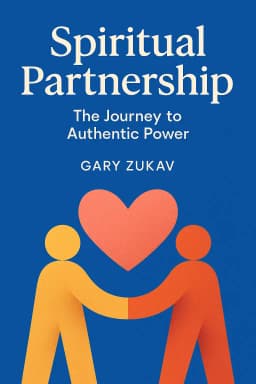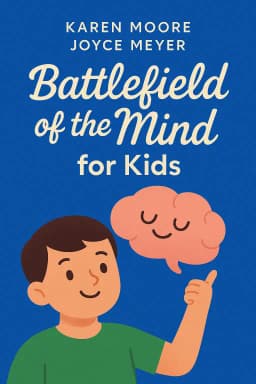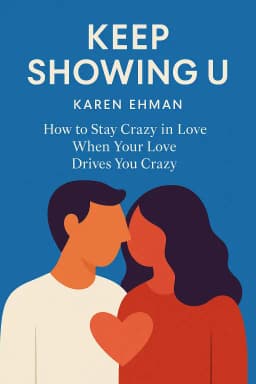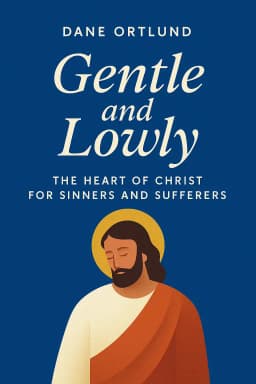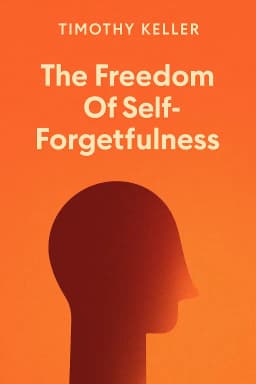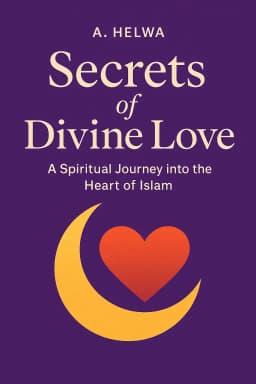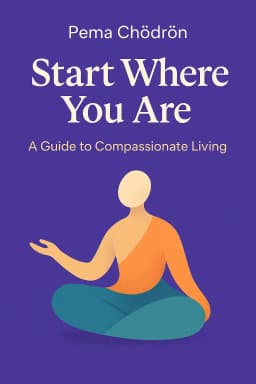
The Resistance Paradox
Golden Hook & Introduction
SECTION
Daniel: Okay, Sophia, quick confession. This morning, I spent ten minutes mentally debating whether to meditate for five minutes. I lost the debate. Sophia: That is the most relatable thing I've heard all week. You just perfectly described the central mystery of human existence: why is it so hard to do the things we know are good for us? Daniel: It’s this bizarre internal friction, right? And it's that exact mystery that's at the heart of the book we're diving into today: Resisting Happiness by Matthew Kelly. Sophia: Matthew Kelly. What's fascinating about him is that he's this globally renowned speaker, sold millions of books, but by his own admission, he's a deep introvert. Writing this book, sharing his own struggles with this very topic, was apparently a huge personal challenge for him. Daniel: Exactly. And that vulnerability is what makes the book's core idea so powerful. He’s not talking down from a mountain of perfect self-discipline. He’s in the trenches with the rest of us, trying to figure out why we so consistently get in our own way. Sophia: The book itself has had a really interesting life. It’s not just a bestseller; it became the foundation for this massive online program called 'Best Lent Ever,' where hundreds of thousands of people work through these ideas together. It clearly struck a nerve. Daniel: It absolutely did. And it all starts with giving a name to that feeling you and I were just talking about—that internal debate you always lose. Kelly calls it "resistance."
The Paradox of Resistance: Why We Actively Sabotage Our Own Happiness
SECTION
Sophia: Resistance. I like that. It sounds more official than just 'being lazy' or 'procrastinating.' It gives my arch-nemesis a proper villain name. Daniel: That's precisely the point! The book argues that we should stop thinking of it as a personal character flaw, like laziness, and start seeing it as an external force, almost like gravity. It's a universal pull towards the path of least effort, towards distraction, towards doing anything except the thing that will actually make us happier or better. Sophia: Okay, so it’s the force field that magically appears between me and my running shoes every morning. It’s the sudden, urgent need to alphabetize my spice rack when I have a deadline. Daniel: Exactly. The book is full of these little diagnostic questions. One of the first things the study guide asks is for you to rate your happiness on a scale of one to ten over the last three months. Then it asks you to name the "hard battle" you're currently fighting. Sophia: Whoa, jumping right into the deep end. I can see why people do this in groups. It feels a little intense to ask yourself that alone in your kitchen. Daniel: It is, but it’s designed to make you confront the gap between the life you want and the life you’re living. The book's premise is that "resistance" is what lives in that gap. Let’s imagine a character, we’ll call him John. John gets home from work. He knows, with absolute certainty, that he would feel amazing if he went for a 20-minute walk, called his mom who he hasn't spoken to in a week, and spent 30 minutes on that novel he dreams of writing. Sophia: A solid plan for a fulfilling evening. I’m rooting for John. Daniel: But what does John do? He collapses on the couch, opens his phone, and scrolls. An hour passes. He feels a little worse. He orders takeout he knows will make him feel sluggish. Another hour of scrolling. Now he feels a sort of low-grade guilt and anxiety. By the time he goes to bed, he’s actively less happy than when he got home. He has done the polar opposite of what would bring him joy. That, in a nutshell, is resistance in action. Sophia: Oh, I know John. I am John on Tuesdays. And Thursdays. But why? Why do we do that? It’s illogical. Is it just about seeking comfort and avoiding effort? Daniel: The book suggests it's deeper than that. The resistance isn't just about avoiding the effort of the run or the awkwardness of the phone call. It's about avoiding the person you might become if you actually did those things. Sophia: Hold on, unpack that. That sounds counterintuitive. Why would I want to avoid becoming a happier, healthier, more creative person? Daniel: Because that person has new responsibilities. That person has to keep it up. If you start writing your novel, you might have to face the possibility that it’s not very good. If you get in shape, you have to maintain it. If you start being a more thoughtful son, you raise the bar for yourself. Resistance, in Kelly's view, is a defense mechanism to keep us in the "safety" of our current, less-than-ideal self. It keeps us from having to truly try, and therefore, from the possibility of failing. Sophia: Wow. So it’s a fear of our own potential. Resistance is the bodyguard of our comfort zone. Daniel: A perfect way to put it. It keeps us busy with trivial things so we don't have to ask the big, scary questions, like "What is my purpose?" or "Am I living a meaningful life?" The book frames this in a spiritual context, suggesting that resistance is what keeps us from connecting with God's plan for us. Sophia: And that’s where the book gets its mixed reception, right? I’ve seen that while many readers find it life-changing, some critics and readers find the heavy Catholic focus to be a bit alienating or repetitive. They feel like the answer to everything is just 'pray more.' Daniel: That's a fair critique, and it's definitely written from a very specific faith perspective. But I think the underlying psychological insight is universal. Whether you call it "God's plan" or "your authentic self" or "your deepest values," the principle is the same: there's a higher version of you that you're capable of becoming, and there's an internal force actively working to stop you. Sophia: Okay, so we're all diagnosed with a chronic case of resistance. We're all masters of self-sabotage. We're doomed. Great episode. What's the fix?
Living Soulfully as the Antidote
SECTION
Daniel: (laughs) Right. Well, the book wouldn't be much of a bestseller if it just left us there. The second half is all about the antidote, which Kelly calls "Living Soulfully." Sophia: That sounds… a little vague. Like something you'd see on a throw pillow. What does that actually mean in practice? Daniel: It's more practical than it sounds. It's about making a series of small, intentional choices that counteract the gravitational pull of resistance. The book breaks it down. For example, it reframes the purpose of work. It argues the primary purpose of your job isn't just to make money, but to help you become the-best-version-of-yourself. Sophia: That's a beautiful thought. But tell that to someone working two soul-crushing minimum-wage jobs just to pay rent. How does that concept apply when your work is just about survival? Daniel: It's a huge challenge, and the book doesn't ignore that. The idea isn't that every job has to be your dream passion. It's about your approach. Can you find a way to practice patience with a difficult customer? Can you take pride in doing a simple task with excellence? Can you be a source of kindness for a coworker? These are the small ways you use the circumstances you're in, no matter how difficult, as a training ground for becoming a better person. It's about finding the soul in the work, not necessarily finding your dream job. Sophia: Okay, I can see that. It's about shifting the focus from the external task to the internal virtue you're building. What else is in this 'living soulfully' toolkit? Daniel: A big one is habits. The book is obsessed with the idea that we are our habits. It argues that you don't just decide to be a better person; you build the habits of a better person. One of the discussion questions is literally, "What is one life-changing habit you could create this Lent?" It's very action-oriented. Sophia: So instead of a vague goal like "be happier," it's a concrete habit like "spend the first five minutes of my lunch break reading a book instead of scrolling social media." Daniel: Precisely. And this is where the community aspect, which you mentioned earlier, becomes so important. The book provides a fantastic real-world example in its analysis section, talking about a small faith group in St. Louis. Sophia: The Lenten journey story? Tell me about it. Daniel: So this group of eight people decided to use Resisting Happiness for their weekly meetings during Lent. They followed the study guide's format: they'd pray, watch one of the daily videos from the 'Best Lent Ever' program, and then use the discussion questions to talk about their own lives. It wasn't just abstract theory anymore. Sophia: It became a lab for their own lives. Daniel: Exactly. The story highlights one member, a guy named John, who realized through the discussions that he was constantly comparing himself to others—his friends' careers, their vacations, their houses. This constant comparison was the engine of his unhappiness. It was his primary form of resistance. Sophia: Because it kept him focused outward, on what he lacked, instead of inward, on what he could build. Daniel: You got it. And the group didn't just nod along. They offered him support, they shared their own struggles with comparison, and they talked about practical strategies for shifting his perspective. By the end of Lent, he wasn't "cured," but he was deeply aware of this pattern. He had a name for his resistance, and he had a community helping him fight it. That's "living soulfully" in action—it's awareness, intentionality, and connection. Sophia: That makes the concept much more grounded. But it still brings me back to the faith question. That group was a faith group. The book talks about prayer, confession, and "Thy Will Be Done." Is it possible to get the benefits without the theology? Can you separate the psychological tools from the religious framework? Daniel: I think you can. Kelly is writing for a specific audience, so he uses the language and rituals of Catholicism. But you can translate the principles. "Prayer" can be secular meditation or journaling—a practice of quiet reflection and gratitude. "Confession" can be radical honesty with a trusted friend or a therapist about where you've fallen short. "Thy Will Be Done" can be understood as surrendering to the things you can't control and focusing your energy on what you can. Sophia: So it's about finding a practice of humility, reflection, and connection, whatever that looks like for you. Daniel: Yes. The core message is that resistance thrives in isolation and mindlessness. The antidote, therefore, is connection and mindfulness. Connection to your deeper self, connection to others, and for Kelly, connection to God. The framework is Catholic, but the human need it addresses is universal.
Synthesis & Takeaways
SECTION
Daniel: When you put it all together, you see this elegant, simple dynamic at the heart of the book. Resistance is our default setting. It's spiritual entropy, the tendency for things to fall into disorder and complacency. Sophia: It’s the path of least resistance, which ironically, leads to the most resistance against our own happiness. Daniel: What a perfect way to say it. And "Living Soulfully" is the active, conscious, and sometimes difficult effort required to counteract that entropy. It’s about generating your own spiritual energy through intentional habits and practices. Sophia: So the big takeaway isn't some secret trick to eliminate struggle. The struggle is guaranteed. The book is a strategy guide for how to engage in that struggle more effectively. Daniel: Exactly. It reframes the entire pursuit of happiness. The book argues that happiness isn't something you find or achieve. It's something you simply stop resisting. You get out of your own way and allow the joy that's already available to you to come through. Sophia: I like that. It feels less overwhelming. The challenge isn't to suddenly become this perfect, enlightened person overnight. The challenge is just to notice one moment today where you're resisting something good for you—like my five-minute meditation debate—and just... nudge yourself in the other direction. Just for that one moment. Daniel: That's the whole game. One small nudge at a time. And maybe the most powerful question the book leaves you with is a very simple one to carry into the rest of your day. Sophia: What's that? Daniel: What is the one small, good thing you're resisting right now? Sophia: A powerful and slightly uncomfortable question. A perfect place to end. Daniel: This is Aibrary, signing off.
